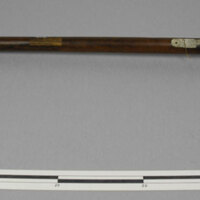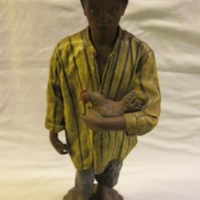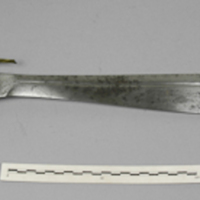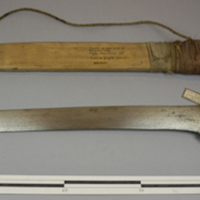Axe-adze
Text
Axe-adze with heavy rectangular blade that is triangular in long section, with a square tang in an iron-plated socket with wooden haft. [SM 25/07/2007]
Share this
Media
Images
Map Pitt Rivers Museum
Metadata
Subject
Axe-adze
Date
Date made: 1874
Type
Weapon, Tool
Identifier
1884.21.35
Origin
Mindanao Island, Philippines
Materials
Iron, wood
Processes: Forged, carved.
Processes: Forged, carved.
Physical Dimensions
Length: max 652 mm
Width: max 212 mm
Width: max 212 mm
Provenance
Augustus Henry Lane Fox, Pitt Rivers founding collection. Collected by 1874.
Acquisition Date
1884
Display status
Not on display
Display history:
Pitt Rivers sent this object to Bethnal Green Museum for display, as part of the first batch of objects sent there, probably in 1874. Object was listed in the Delivery Catalogue as having been transferred from South Kensington Museum in 1884.
Display history:
Pitt Rivers sent this object to Bethnal Green Museum for display, as part of the first batch of objects sent there, probably in 1874. Object was listed in the Delivery Catalogue as having been transferred from South Kensington Museum in 1884.
Official Website
Collection
Cite this Page
“Axe-adze,” Mapping Philippine Material Culture, accessed April 19, 2024, https://philippinestudies.uk/mapping/items/show/27733.
Subjects
Geolocation
Sensitive Content
Mapping Philippine Material Culture collates digital material from institutions, and some of this material is inherently colonial and contains words, terms and phrases that are inaccurate, derogatory and harmful towards Filipino and Filipino diasporic communities. Catalogue transcriptions, book titles, exhibition titles and museum titles may contain harmful terms. We recognise the potential for the material to cause physical and mental distress as well as evoke strong emotions. Owing to the scale of the collection’s data, a process to implement sensitive-content warnings in the displayed data is still incomplete. The material within the catalogue does not represent Mapping Philippine Material Culture’s views. Mapping Philippine Material Culture maintains a strong anti-colonial, anti-racist position and affirms its support for centring the humanity of historically marginalised and disenfranchised communities.
Facebook Twitter



